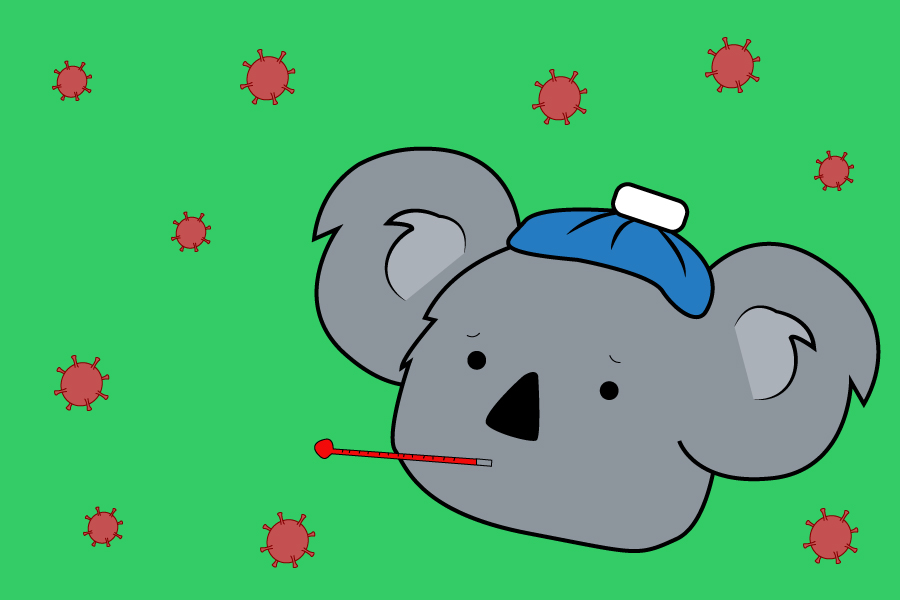
Disruption of koala microbes raise questions for microbial biologists
A recent study from the Jonathan Eisen Lab at UC Davis looked at how the gut biomes of koalas are being disrupted by antibiotic treatment. Katherine Dahlhausen, a graduate student of biophysics and the lead researcher, came upon the project almost by happenstance.
“I was on a holiday in Australia, and I went to an Australian zoo,” Dahlhausen said. “Outside the koala exhibit, there was a sign that had a picture of a baby koala with brown stuff on its face and the sign said ‘It’s not chocolate! Babies eat their mom’s poo before they eat eucalyptus leaves’. I was like, well, that has to be microbial.”
Indeed it is, as Dahlhausen found from her research into the literature on the gut biomes of koalas. The baby koalas eat the excrement of their mother, also known as pap, in order to receive the critical bacteria necessary for their digestion of eucalyptus leaves as an adult. If the koalas do not receive these critical bacteria, they may have decreased lifespan due to the fact they the live almost exclusively on eucalyptus leaves.
While little is still known about gut microbes, it is generally thought that they play an important role in overall health.
“For mammals — and other animals — it is thought that for many the microbiome of the gut plays some key roles in health and well being,” said Jonathan Eisen, the lead microbial biologist of the lab responsible for the study. “Examples include aiding in digestion, helping with development of the immune system, preventing the invasion of pathogens and preventing the development of some cancers and more.”
Being fussy when it comes to their diet, koalas present a highly-specific subject of study for microbial biologists like Dahlhausen. One bacterium that has been correlated to the health of koalas is Lonepinella koalarum, a known degrader of the harsh tannins found in eucalyptus leaves.
During her research, Dahlhausen found out that koalas have an exceptionally high infection rate for chlamydia, with some populations having a rate as high as 100 percent. Likely infected originally from coming into contact with the fecal matter of livestock introduced by Europeans to Australia, infected mothers can pass the disease on to their babies through the pap. Because of the obscenely high infection rate, koalas are now regularly treated for chlamydia with antibiotics.
“As in human medicine, veterinarians practice antibiotic stewardship,” said Valerie Fates, a student at the UC Davis School of Veterinary Medicine. “Excessive use of antibiotics is a big problem and leads to drug resistant bacteria and infections that we can’t treat effectively. So, when antibiotics are required for treatment, we make sure to use them wisely.“
Even with antibiotic stewardship, the antibiotics are likely disrupting the composition of gut bacteria in koalas.
“In humans, when you take a course of antibiotics, you can kill the infection you’re taking antibiotics for, but it also disrupts the microbial communities that you have already,” Dahlhausen said. “There was no research as to how these antibiotics were affecting koala gut microbes, and to me this was really interesting.”
In her research, Dahlhausen found that the koalas who died after antibiotic treatment failed to have Lonepinella koalarum in their gut biome. In those that survived the treatment, the bacteria persisted. While it is unclear if the antibiotics are solely responsible for the loss of the bacteria, a complementary treatment that considers the health of the koala’s gut biome is being considered.
One such treatment that Dahlhausen thinks could be effective is fecal transplant, where feces from a healthy animal is transplanted into an unhealthy animal. While it has been shown to be effective in humans, it remains a controversial procedure.
“I argue fecal transplant because you don’t know if we just gave them a probiotic of the Lonepinella that we know degrades tannins, maybe that won’t be enough, because we don’t know what community is making them resilient through the end of treatment,” Dahlhausen said.
Written by: Matt Marcure — science@theaggie.org








